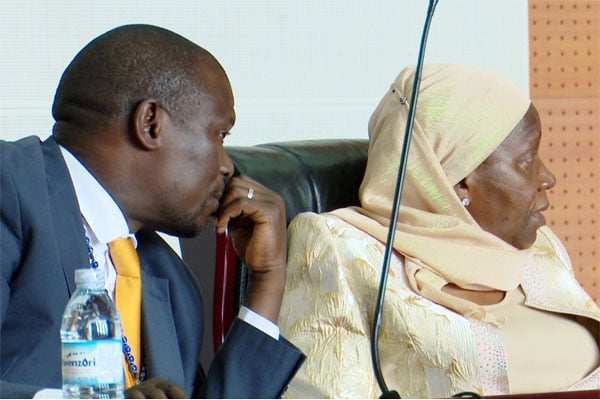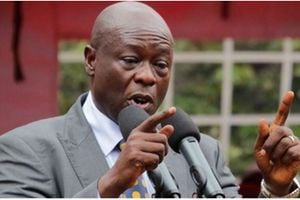Farmers, district planners decry ‘disastrous’ agriculture budget cut

Mr Richard Oboi, Soroti District planner contributes at a national budget listening and dialogue at Margarita Palace Hotel in Lira City on June 13, 2024. PHOTO/ BILL OKETCH
What you need to know:
- Ms Jesca Omodo, programme officer in charge of advocacy for PELUM Uganda, urged the government to boost allocations in line with the Malabo Declaration.
Farmers, district planners and non-state actors have decried government cuts on funding to agriculture, warning that continuous budget reduction to production – an engine for local revenue – is disastrous.
Minister for Finance, Planning and Economic Development, Mr Matia Kasaija, on Thursday read the 2024/2025 National Budget, which saw a reduction of the allocation to agriculture from the initial Shs 1.805 trillion to the current Shs 1.6 trillion.
However, farmers, district planners and agriculture officers, and members of civil society organisations (CSOs) have warned that the budget cut is likely to exacerbate conflicts in the country. Such potential conflicts, they say, could emanate from low household incomes, food and nutritional security thus creating ruthlessness among unemployed youth – most of whom derive their livelihoods from agricultural production.
Mr Francis Ojok, the Amolatar District production officer, noted that the problem hindering local revenue enhancement mainly comes from demotivation from the outcome of local revenue sharing.
“For instance, a sector like production is an engine for local revenue. We generate revenue through movement permits, fishing, produce sales and the like but when it comes to giving back to the department in the end you get zero… This is demotivating. You should milk the cow but also feed the cow. If you are milking the cow without feeding, it will not be very good,” he said.
Another challenge, he said, is “there is a lot of biases in allocating Indicative Planning Figures (IPF) between central government and local government.
“Local government is where the delivery units are, where the farmers are, where the engine for agro-industrialisation is, where the production is. But you find that the local government gets about 30 per cent, then the 70 per cent remains in the ministries, departments and agencies yet they are not implementing anything,” Mr Ojok added at the national budget listening and dialogue meeting at Margarita Palace Hotel in Lira City on Thursday.
The one-day event was organized by Participatory Ecological Land Use Management (PELUM) Uganda with financial support from Bread for the World, Uganda Community Based Association for Women and Children Welfare (UCOBAC) and Caritas Uganda.
At least 93 people, including district planners, gender and agricultural officers, member organisations and farmers’ representatives from across Busoga, Bugishu, Teso, Karamoja, Lango, Acholi and West Nile attended the meeting.
Ms Jesca Omodo, programme officer in charge of advocacy for PELUM Uganda, urged the government to boost allocations in line with the Malabo Declaration.
At the African Union Summit in Malabo- Equatorial Guinea in June 2014, heads of state and government adopted a remarkable set of concrete agriculture goals to be attained by 2025, this newspaper has learnt.
The Malabo Summit reconfirmed that agriculture should remain high on the development agenda of the continent, and is a critical policy initiative for African economic growth and poverty reduction.
Uganda, one of the countries that ratified and is a signatory, was supposed to be witnessing 10 per cent of the total national budget allocation to agriculture.
“No wonder we say agriculture is the backbone of the economy but the allocations do not translate to the rhetoric. So, our call for action in the discussion is how the planners that have attended across the sub-regions stated early can live up to that declaration but also improve the production and productivity, which is the easiest way to drive the country to the middle-income status as per the Vision 2040,” Ms Omodo added.
According to Soroti District planner, Mr Richard Oboi, politicians are a problem to the budgeting processes.
“In Parliament, they have four roles; legislation, oversight roles, appropriation and representation. Now these are the people who are supposed to make our budget better, but you find that about 80 per cent of our budget is consumptive, and only 20 per cent is for capital investments,” he said.
“The law is saying as long as you can speak English or somebody has attained a level of Senior Six you can become an MP (Member of Parliament). Now what can somebody who has been to Senior Six do for the entire country when they are in Parliament? You’re doing things of national importance, but in terms of numeracy and technical skills, you don’t have. So, that is a big problem.”
Ms Lilly Opinya Okello, a farmer from Amolatar District, said: “For the extension workers to move around for the farmers’ sensitisation, they need fuel and allowances. So, if the budget is not favouring them it makes them not work properly within the communities.”


